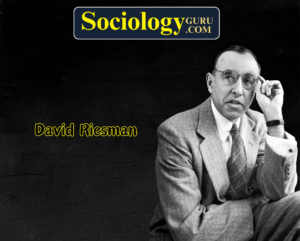Question: David Riesman distinguished three main sociological typologies, each representing different model of conformity or of responses to social control. The types are tradition directed, inner directed and historic. Which popular book of Riesman carried this distinction?
- The Lonely Crowd
- Wisdom of Men
- The Utopian World
- Mind, Self and Society
Answer: (1)David Riesman’s “The Lonely Crowd” and Sociological TypologiesDavid Riesman, a prominent American sociologist, made significant contributions to the understanding of societal dynamics, particularly in relation to individual behavior and conformity. His seminal work, “The Lonely Crowd: A Study of the Changing American Character,” explores distinct sociological typologies, categorizing individuals into tradition-directed, inner-directed, and other-directed types. This analysis delves into the key concepts presented in “The Lonely Crowd” and examines the societal implications of Riesman’s typologies. David Riesman: A Brief Overview:
Sociological Typologies in “The Lonely Crowd”:
Societal Implications and Critique:
Legacy of “The Lonely Crowd”:
Conclusion:David Riesman’s “The Lonely Crowd” stands as a landmark work in sociology, offering insights into the evolving character of American society. The typologies presented—tradition-directed, inner-directed, and other-directed—provided a framework for understanding how societal changes shape individual behavior. While subject to critique for its simplifications, Riesman’s work remains influential, fostering ongoing exploration of societal dynamics and individual responses to cultural shifts. “The Lonely Crowd” endures as a foundational text that invites scholars and readers alike to contemplate the intricate interplay between individuals and the societies they inhabit. |
Take a Quick Sociology Quiz to measure your Performance
Frequently Asked Questions:
1. Question: Define the term “ethnic movement” and provide an example from India.
Answer: An ethnic movement refers to a collective effort by a group sharing common cultural, linguistic, or religious traits, seeking to assert their identity and rights; an example from India is the Khalistan Movement in Punjab.
2. Question: Identify the main objectives behind the Gorkhaland ethnic movement.
Answer: The Gorkhaland ethnic movement primarily seeks to establish a separate state for India’s Nepali-speaking population in the Darjeeling region, advocating for linguistic and cultural recognition and political autonomy.
3. Question: What was the Operation Blue Star, and which ethnic movement was it related to?
Answer: Operation Blue Star was a military action in 1984, aiming to remove Sikh militants hiding in the Golden Temple in Amritsar; it is related to the Khalistan movement, which sought a separate Sikh country.
4. Question: Mention a critical factor that triggered the emergence of ethnic movements in India, as discussed by Dipankar Gupta.
Answer: Dipankar Gupta emphasized that ethnicity is fundamentally a political process, wherein caste and religion, the key components of identity formation, are politicized by leaders for vested interests.
5. Question: What were the primary reasons for the Assam Ethnicity conflicts involving Bodo tribals and Bengali Muslim settlers?
Answer: The Assam Ethnicity conflicts primarily stemmed from issues related to immigration, land rights, and resource allocation, leading to clashes, riots, and evolving relationships among indigenous communities to address challenges.
6. Question: Briefly describe the role of the Dravidian Movement in terms of caste and societal structure.
Answer: The Dravidian Movement, led notably by E.V. Ramasamy, aimed to establish an egalitarian society, focusing on anti-Brahmanism and advocating for equal rights for backward castes, while also introducing reforms like self-respect marriages.
7. Question: Name the prominent ethnic movements in North-East India and specify one common objective.
Answer: Prominent ethnic movements in North-East India include the Nagas’ and Mizos’ struggles; a common objective was to gain autonomy and recognition for their distinct tribal identities and cultural uniqueness.
8. Question: What is the key argument of Gail Omveldt regarding traditional Indian society and multiculturalism?
Answer: Gail Omveldt opposed romanticizing traditional Indian society, arguing that hierarchy has always dominated it and dismissing the notion that multiculturalism is an intrinsic feature of Indian society as a myth.
9. Question: Briefly explain the social hierarchy factor as a contributing element to ethnic movements as suggested by Olzak.
Answer: Olzak suggests that the construction of hierarchies among ethnic communities, which often leads to the suppression of one group by another, is a key factor that can instigate social and ethnic movements.
10. Question: Identify one consequence of the unequal economic development factor within the context of ethnic movements in India.
Answer: One consequence of unequal economic development is the marginalization and underdevelopment of certain groups, leading to feelings of alienation and sometimes initiating ethnic movements as these groups strive for equality and recognition.
To master these intricacies and fare well in the Sociology Syllabus, aspiring sociologists might benefit from guidance by the Best Sociology Teacher and participation in the Best Sociology Coaching. These avenues provide comprehensive assistance, ensuring a solid understanding of sociology’s diverse methodologies and techniques.
META TAGS:
Why Vikash Ranjan’s Classes for Sociology?
Proper guidance and assistance are required to learn the skill of interlinking current happenings with the conventional topics. VIKASH RANJAN SIR at SOCIOLOGY GURU guides students according to the Recent Trends, making him the Best Sociology Teacher for Sociology.
At Sociology Guru, the Best Sociology Coaching platform, we not only provide the best study material and applied classes for Sociology but also conduct regular assignments and class tests to assess candidates’ writing skills and understanding of the subject.
Choose The Best Sociology Teacher for your Preparation?
To master these intricacies and fare well in the Sociology Syllabus, aspiring sociologists might benefit from guidance by the Best Sociology Teacher and participation in the Best Sociology Coaching. These avenues provide comprehensive assistance, ensuring a solid understanding of sociology’s diverse methodologies and techniques. Sociology, Social theory, Best Sociology Teacher, Best Sociology Coaching, Sociology Syllabus.
Best Sociology Teacher, Sociology Syllabus, Sociology, Sociology Coaching, Best Sociology Coaching, Best Sociology Teacher, Sociology Course, Sociology Teacher, Sociology Foundation, Sociology Foundation Course, Sociology CUET, Sociology for IAS, Sociology for UPSC, Sociology for BPSC, Sociology for UGC NET, Sociology for JPSC,
Follow us :
KEYWORD:-Sociological Typologies, Sociological Typologies, Sociological Typologies, Sociological Typologies Sociological Typologies, Sociological Typologies, Sociological Typologies, Sociological Typologies, Sociological Typologies, Sociological Typologies, Sociological Typologies, Sociological Typologies, Sociological Typologies, MA CUET SOCIOLOGY



